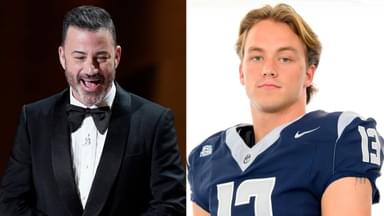Earlier this year, former NFL running back Reggie Bush regained possession of his Heisman Trophy. Now, he’s looking to vindicate himself and others from ostensible wrongdoings done by the NCAA.
Advertisement
Last week, Bush sued the NCAA, the University of Southern California (USC), and the Pac-12 for compensation tied to his collegiate name, image, and likeness (NIL). In a statement, Bush’s lawyers claimed USC “exploited” him during his three-year stint as a Trojan:
“[Our goal is] to address and rectify ongoing injustices stemming from the exploitation of Reggie Bush’s name, image, and likeness during his tenure as a USC football player.”
Many have wondered why Bush, after all this time, is spending so much time and money pursuing what’s sure to be a lengthy litigation process. In his mind, he’s fighting for the rights of every past, present, and future college football player.
While top college athletes are raking in big money now, that was not always the case. The NCAA’s rules prevented such things when Bush and his peers were student-athletes.
The previous system profited heavily from athletes’ abilities, whether it was TV deals or merchandise sales. Meanwhile, the players could not benefit whatsoever from their own fame and talent for a living. It was only in 2021, that these restrictions were lifted, allowing college athletes to benefit from NIL deals.
But can the NCAA really be punished for following the stipulations of a previous era 20 years after the fact? And will it even matter?
Bush’s fight is against past injustices
With an estimated net worth of $25 million, Bush isn’t going through all this trouble just for money. His lawyers confirmed his aspirations actually focus on establishing a new standard for the treatment of athletes at the collegiate level.
“This case is not just about seeking justice for Reggie Bush. It’s about setting a precedent for the fair treatment of all college athletes… and pave the way for a system where athletes are rightfully recognized, compensated and treated fairly for their contributions.”
While the NCAA’s rule change in 2021 is a great leap, Bush aims to rectify the unfairness of what he and his peers suffered. Or at the very least shine a light on the unfairness of the previous system.
Bush was a dominant force with the Trojans. He helped USC win two national championships – and nearly a third – in his collegiate career.
Despite being one of the faces of the sport, he was not allowed to profit off of his exceptional ability. At the same time, the institutions he served pocketed millions from it. Nobody can fault Bush for wanting to get a portion of that money for himself and his peers.
However, can recent rule changes truly be retroactively applied to the sport’s entire history? How would universities be able to appropriately compensate every athlete it previously rostered in addition to every player it will feature in the future?
This case involves two parties who both have strong claims to what they desire. It feels highly unlikely that Bush will be able to set such a major precedent; if he won, the entire college sports system could crumble.
But the chance to earn paydays for those who didn’t play 11 years in the NFL doesn’t come around often. He’s striking while the iron is hot. And this may be the best opportunity he ever gets.








